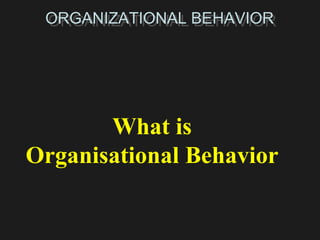Itm ob-01 b
- 1. ORGANIZATIONAL BEHAVIORWhat is Organisational Behavior
- 2. Define organizational behavior (OB).Describe what managers do.Explain the value of the systematic study of OB.List the major challenges and opportunities for managers to use OB concepts.Identify the contributions made by major behavioral science disciplines to OB.L E A R N I N G O B J E C T I V E S
- 3. Describe why managers require a knowledge of OB.Explain the need for a contingency approach to the study of OB.L E A R N I N G O B J E C T I V E S (≥¶¥«≤‘≥Ÿ‚Äôd)
- 4. What Managers DoManagerial ActivitiesMake decisions
- 6. Direct activities of others to attain goalsWhere Managers Work
- 12. 1-1aE X H I B I TMintzberg’s Managerial Roles
- 13. 1-1bE X H I B I TMintzberg‚Äôs Managerial Roles (≥¶¥«≤‘≥Ÿ‚Äôd)
- 14. 1-1cE X H I B I TMintzberg‚Äôs Managerial Roles (≥¶¥«≤‘≥Ÿ‚Äôd)
- 16. Effective Versus Successful Managerial Activities (Luthans)Traditional managementDecision making, planning, and controllingCommunicationsExchanging routine information and processing paperworkHuman resource managementMotivating, disciplining, managing conflict, staffing, and trainingNetworkingSocializing, politicking, and interacting with others1-2E X H I B I TAllocation of Activities by Time
- 18. Contributing Disciplines to the OB Field1-3aE X H I B I T
- 19. Contributing Disciplines to the OB Field (≥¶¥«≤‘≥Ÿ‚Äôd)1-3bE X H I B I T
- 20. Contributing Disciplines to the OB Field (≥¶¥«≤‘≥Ÿ‚Äôd)1-3cE X H I B I T
- 21. Contributing Disciplines to the OB Field (≥¶¥«≤‘≥Ÿ‚Äôd)1-3dE X H I B I T
- 22. Contributing Disciplines to the OB Field (≥¶¥«≤‘≥Ÿ‚Äôd)1-3fE X H I B I T
- 23. There Are Few Absolutes in OBContingencyVariablesxy
- 24. Challenges and Opportunity for OBResponding to GlobalizationManaging Workforce DiversityImproving Quality and ProductivityResponding to the Labor ShortageImproving Customer Service
- 25. Challenges and Opportunity for OB (≥¶¥«≤‘≥Ÿ‚Äôd)Improving People SkillsEmpowering PeopleCoping with ‚ÄúTemporariness‚ÄùStimulation Innovation and ChangeHelping Employees Balance Work/Life ConflictsImproving Ethical Behavior
- 26. 1-6E X H I B I TBasic OB Model, Stage I
- 28. The Dependent Variables (≥¶¥«≤‘≥Ÿ‚Äôd)
- 29. The Dependent Variables (≥¶¥«≤‘≥Ÿ‚Äôd)
- 30. The Dependent Variables (≥¶¥«≤‘≥Ÿ‚Äôd)
- 31. The Dependent Variables (≥¶¥«≤‘≥Ÿ‚Äôd)
- 32. The Independent VariablesIndividual-Level VariablesGroup-LevelVariablesOrganizationSystem-LevelVariablesIndependentVariables
































